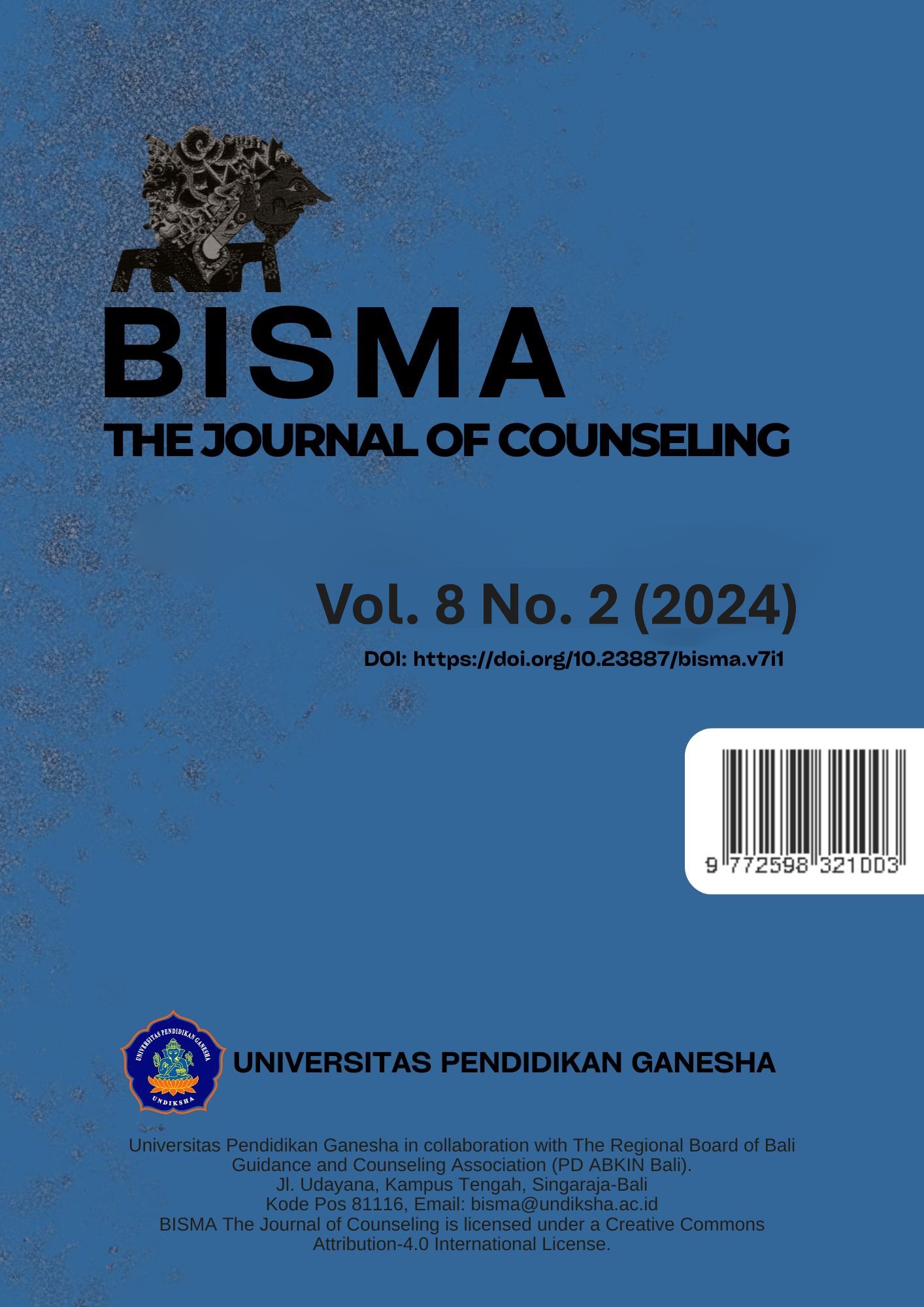Intergenerational Trauma: Exploring Transmission Mechanisms in Post-Conflict Families
DOI:
https://doi.org/10.23887/bisma.v8i2.85107Keywords:
Intergenerational Trauma, Exploring Transmission, Post-Conflict FamiliesAbstract
Trauma due to communal conflict creates a lasting impact even after the conflict has ended. Trauma not only affects individuals who experience it directly, but also has an impact on the family and social environment, which in turn has an impact across generational boundaries. This study aims to explore and analyze the mechanisms of intergenerational trauma transmission in post-conflict families, where trauma can be transmitted both directly and indirectly through psychological, family, and social interactions. The approach used is qualitative with a case study design, involving parents who experience conflict and children who are not directly involved. Data were collected through observation and in-depth interviews, then analyzed using qualitative descriptive methods, and their validity was strengthened using triangulation of data sources. The results of the study indicate that the transmission of trauma in families occurs through two main aspects: parenting patterns and the influence of the social environment. Parenting patterns that are formed from traumatic experiences of parents after conflict, especially those that have not been handled properly, tend to be overprotective and full of strict instructions. The social environment becomes a place for children to confirm the trauma received from parenting patterns which then strengthen the transmission of this trauma. These two aspects are interrelated in forming patterns and processes of intergenerational trauma transmission.
References
Alexander, J. C. (2012). Trauma: A Social Theory. Polity Press.
Appleyard, K., & Osofsky, J. D. (2003). Parenting after trauma: Supporting parents and caregivers in the treatment of children impacted by violence. Infant Mental Health Journal, 24(2), 111–125. https://doi.org/10.1002/imhj.10050.
Banyard, V. L., Rozelle, D., & Englund, D. W. (2001). Parenting the traumatized child: Attending to the needs of nonoffending caregivers of traumatized children. Psychotherapy: Theory, Research, Practice, Training, 38(1), 74–87. https://doi.org/10.1037/0033-3204.38.1.74.
Bradfield, B. C. (2013). The intergenerational transmission of trauma as a disruption of the dialogical self. Journal of Trauma & Dissociation, 14(4), 390–403.
Brunzell, T., Stokes, H., & Waters, L. (2016). Trauma-informed positive education: Using positive psychology to strengthen vulnerable students. Contemporary School Psychology, 20, 63–83.
Cresswell, J. W. (2012). Educational Research. Pearson.
Dalgaard, N. T., Diab, S. Y., Montgomery, E., Qouta, S. R., & Punamäki, R. L. (2019). Is Silence About Trauma Harmful for Children? Transgenerational Communication in Palestinian Families. Transcultural Psychiatry, 56(2), 398–427. https://doi.org/10.1177/1363461518824430.
Danieli, Y. (1998). International Handbook of Multigenerational Legacies of Trauma. Springer Science & Business Media.
Danieli, Y., & Maidan, I. (2023). Multigenerational Legacies of Trauma. Psychosomatic Medicine and General Practice, 8(1). https://doi.org/10.26766/PMGP.V8I1.409.
Esmaeili, S. (2011). Intergenerational transmission of trauma: Traumatic impact on second-generation Armenian genocide survivors and its effects on parenting. Alliant International University.
Fitzgerald, M., London-Johnson, A., & Gallus, K. L. (2020). Intergenerational transmission of trauma and family systems theory: an empirical investigation. Journal of Family Therapy, 42(3), 406–424. https://doi.org/10.1111/1467-6427.12303.
Gogali, L. (2009). Konflik Poso: Suara Perempuan dan Anak Menuju Rekonsiliasi Ingatan. Galang Press.
Grand, S., & Salberg, J. (2017). Trans-generational Trauma and the Other: Dialogues Across History and Difference. Routledge.
Green, D. (2008). From Poverty to Power: How Active: How Active Citizens and Effective States can Change the World. Oxfam International.
Hedman, E.-L. (2008). Conflict, Violence, and Displacement in Indonesia. Southeast Asia Program Publications.
Jensen, S. K. G., Sezibera, V., Murray, S. M., Brennan, R. T., & Betancourt, T. S. (2021). Intergenerational impacts of trauma and hardship through parenting. Journal of Child Psychology and Psychiatry and Allied Disciplines, 62(8), 989–999. https://doi.org/10.1111/jcpp.13359.
Kellermann, N. P. (2001). Transmission of Holocaust Trauma-An Integrative View. Psychiatry Interpersonal & Biological Processes, 64(3), 256–267. https://doi.org/10.1521/psyc.64.3.256.18464.
Laha, M. S., Sudarman, F., & Nutfa, M. (2021). Kehidupan Pasca Konflik Dan Ketegangan Relasi Sosial: Suatu Ancaman Kehancuran Social Capital Trust. PREDESTINATION: Journal of Society and Culture, 1(2), 109. https://doi.org/10.26858/prd.v1i2.18549.
McNally, R. J. (2005). Remembering Trauma. Harvard University Press.
Mochmann, I. C. (2017). Children born of war-a decade of international and interdisciplinary research. Historical Social Research/Historische Sozialforschung, 320–346. https://doi.org/http://www.jstor.org/stable/44176035.
Moleong, J. (2017). Metodologi Penelitian Kualitatif. Pt Remaja Rosdakarya.
Motta, R. W. (2008). Secondary Trauma. International Journal of Emergency Mental Health, 10(4), 291–298. https://psycnet.apa.org/record/2009-02319-006.
Nutfa, M., Pulubuhu, D. A. T., & Cangara, S. (2016). Kegagalan Rekonsiliasi Masyarakat Poso Pasca Konflik Komunal. Jurnal Analisis, 5(2), 168–174.
Reuben, A. (2015). When PTSD is Contagious. Therapists and Other People who Help Victims of Trauma Can Become Traumatized Themselves. The Atlantic, 14. https://doi.org/www.theatlantic.com/health/archive/2015/12/ptsd-secondary-trauma/420282/.
Rowland-Klein, D., & Dunlop, R. (1998). The Transmission of Trauma Across Generations: Identification with Parental Trauma in Children of Holocaust Survivors. Australian & New Zealand Journal of Psychiatry, 32(3), 358–369. https://doi.org/10.3109/00048679809065528.
Scharf, M. (2007). Long-term effects of trauma: Psychosocial functioning of the second and third generation of Holocaust survivors. Development and Psychopathology, 19(2), 603–622. https://doi.org/10.1017/S0954579407070290.
Smith, A. J. (2009). Psikologi Kualitatif: Panduan Praktis Metode Riset. Pustaka Pelajar.
Song, S. J., & Ventevogel, P. (2020). Child, Adolescent and Family Refugee Mental Health: A Global Perspective. Springer International Publishing.
Suardi, F., Rothenberg, M., Serpa, S., & Schechter, D. (2017). Trauma and Parenting: Informing Clinical Practice with Recent Research Findings. Current Treatment Options in Pediatrics, 3, 1–14. https://doi.org/10.1007/s40746-017-0075-y.
Ullah, H., Ahmed, H., Tharwani, Z. H., Shaeen, S. K., Rahmat, Z. S., & Essar, M. Y. (2023). Intergenerational Trauma: A Silent Contributor to Mental Health Deterioration in Afghanistan. Brain and Behavior, 13(4). https://doi.org/10.1002/brb3.2905.
Volkan, V. D. (2001). Transgenerational Transmissions and Chosen Traumas: An Aspect of Large-group Identity. Group Analysis, 34(1), 79–97. https://doi.org/10.1177/05333160122077730.
Yehuda, R., Daskalakis, N. P., Bierer, L. M., Bader, H. N., Klengel, T., Holsboer, F., & Binder, E. B. (2016). Holocaust exposure induced intergenerational effects on FKBP5 methylation. Biological Psychiatry, 80(5), 372–380. https://doi.org/10.1016/j.biopsych.2015.08.005.
Downloads
Published
Issue
Section
License
Copyright (c) 2024 Donnye Rura Amping, Maria Goretti Adiyanti, Irene Ludji

This work is licensed under a Creative Commons Attribution 4.0 International License.








